Related Research Articles

Eye Guess was an American game show created by Bob Stewart and hosted by Bill Cullen, which aired on NBC from January 3, 1966, to September 26, 1969. The game combined a general knowledge quiz with a Concentration-style memory element, where the answers were shown to the players and their recall of their positions was tested.
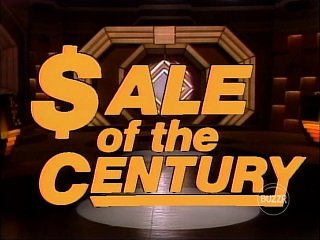
Sale of the Century is an American television game show that originally debuted on September 29, 1969, on NBC daytime. It was one of three NBC game shows to premiere on that date, the other two being the short-lived game shows Letters to Laugh-In and Name Droppers. The series aired until July 13, 1973, and a weekly syndicated series began that fall and ran for one season.
The Joker's Wild is an American television game show that aired at different times between 1972 and 2019. In the show, contestants answer questions based on categories determined randomly by a mechanism resembling a slot machine. The show's title refers to the game's slot-machine mechanism also having jokers.

Now You See It is an American television game show created by Frank Wayne for Mark Goodson-Bill Todman Productions. The object of Now You See It is to answer general knowledge trivia questions by finding the answers hidden in a grid, similar to a word search puzzle.
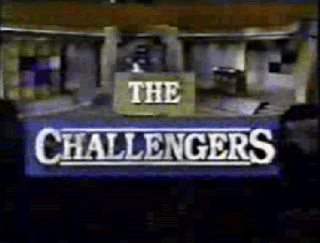
The Challengers is an American game show that aired in syndication from September 3, 1990, until August 30, 1991. The show remained in production for its entire run on the air, differing from most syndicated game shows which usually wrapped in the early summer.

Jackpot is an American and Canadian television game show produced by Bob Stewart which saw contestants attempting to solve riddles in order to win cash and prizes.
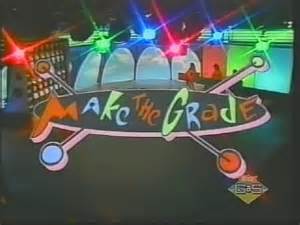
Make the Grade is a children's game show that aired from October 2, 1989, to September 14, 1990, on Nickelodeon.

Celebrity Squares is a British comedy game show based on the American comedy game show Hollywood Squares. It first ran on ITV from 20 July 1975 to 7 July 1979 and was hosted by Bob Monkhouse, then—also hosted by Monkhouse—from 8 January 1993 to 3 January 1997.
Hollywood Showdown is an American game show that aired on both PAX TV and Game Show Network from January to June 2000, then returned solely to GSN on January 1, 2001 and ran until March 30 of that year. Reruns aired on GSN again from September 2004 to April 2005 plus June 2006 and June 2007 on TV Guide Network. Todd Newton served as host, with Randy West announcing.

Tic-Tac-Dough is an American television game show based on the paper-and-pencil game of tic-tac-toe. Contestants answer questions in various categories to put up their respective symbol, X or O, on the board. Three versions were produced: the initial 1956–59 run on NBC, a 1978–86 run initially on CBS and then in syndication, and a syndicated run in 1990. The show was produced by Barry & Enright Productions.
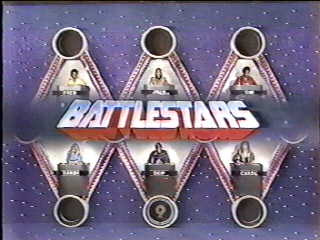
Battlestars is an American game show that aired on NBC during the 1980s. The program's concept was developed and produced by Merrill Heatter, featuring a six-celebrity panel. The object of the game is to "capture" the celebrities by lighting up numbers positioned around triangle shapes, inside of which sat each panelist. Similar to Hollywood Squares, which Heatter also co-created and produced, the celebrities are asked questions by the host, and the contestants judge the truth of their answers in order to light up the numbers.

Temptation was an Australian game show which premiered on the Nine Network on 30 May 2005 and aired at 7.00pm. Hosted by Ed Phillips and Livinia Nixon, the show was a remake of Sale of the Century, which aired on Nine in the same timeslot for more than twenty years between 1980 and 2001. Temptation had the same general format of its predecessor, but with several new features and a de-emphasis on the "shopping" aspects of the endgame. The show ran until 30 November 2007, when it was placed on hiatus by the network following strong competition from game show Deal or No Deal on the rival Seven Network; during the hiatus, Nine filled the timeslot with episodes of the American sitcom Two and a Half Men. When Ed Phillips made an appearance on The NRL Footy Show he announced "maybe summer" would be the return of the show. This statement was accurate, as Temptation returned for a shortened fourth series from 1 December 2008 with unaired episodes which were recorded during 2008. During that time, Ed Phillips was dumped by the Nine Network after his contract expired in November, and Temptation never returned to the schedule. After 23 January 2009, when the show's final episode aired, all Temptation websites were removed, and Two and a Half Men returned to Channel Nine's 7:00pm schedule.
Sale of the Century is an Australian game show that aired on the Nine Network from 14 July 1980 to 29 November 2001. It is based on both Great Temptation that aired from 1970 to 1974 and on the original Sale that first aired in the United States from 1969 to 1973. The Australian format of Sale has since been used internationally, including in a revived US version that aired from 1983 to 1989.

Wheel of Fortune is a British television game show based on the American show of the same name created by Merv Griffin. Contestants compete to solve word puzzles, similar to those used in Hangman, to win cash and prizes. The title refers to the show's giant carnival wheel that contestants spin throughout the course of the game to determine their cash and/or prizes.
Temptation: The New Sale of the Century is an American syndicated television game show loosely based on both the original Australian and American Sale of the Century versions, plus the 2005 Australian version, also titled Temptation. The show began airing in syndication on September 10, 2007, with the last first-run episode airing on May 23, 2008. Reruns continued until September 5, 2008.
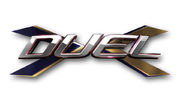
Duel is an American game show hosted by Mike Greenberg that first aired from December 17 to December 23, 2007 on ABC. The show aired as a week-long six-episode tournament at 8:00 p.m. from Monday through Friday with the finale on Sunday.

Break the Bank is an American game show created by Jack Barry and Dan Enright and produced by their production company, Barry & Enright Productions. It was the first game show packaged by Barry and Enright as a tandem since their fall from grace following the 1950s quiz show scandals.
Spellbound is a British game show that aired on Sky One from 3 October 1994 to 30 August 1996. It was hosted by Paul Coia.
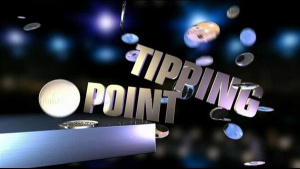
Tipping Point is a British game show that is broadcast on ITV1, although repeats are shown on W and Really. First airing on 2 July 2012, the programme is presented by Ben Shephard and features three players answering questions on the subject of general knowledge to win counters which they use on a large coin pusher arcade-style machine. Only the winner at the end has a chance to take home any money; the others leave with nothing except any non-cash prizes they may have won during the game.